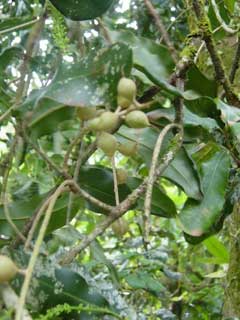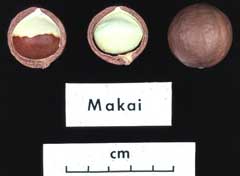 |
|
http://commons.wikimedia.org/wiki/User:Lemmikkipuu |
 |
|
Translate this page:
Summary
Physical Characteristics

 Macadamia_integrifolia is an evergreen Tree growing to 10 m (32ft) by 10 m (32ft) at a slow rate.
Macadamia_integrifolia is an evergreen Tree growing to 10 m (32ft) by 10 m (32ft) at a slow rate.
See above for USDA hardiness. It is hardy to UK zone 9 and is frost tender. It is in leaf all year. The species is hermaphrodite (has both male and female organs) and is pollinated by Bees.
Suitable for: light (sandy), medium (loamy) and heavy (clay) soils and prefers well-drained soil. Suitable pH: mildly acid, neutral and basic (mildly alkaline) soils. It cannot grow in the shade. It prefers moist soil.
UK Hardiness Map
US Hardiness Map
Synonyms
Plant Habitats
Edible Uses
Seed - raw or cooked. The fine, crunchy texture, rich cream colour and delicate flavour make the macadamia nut one of the finest dessert nuts[303
]. The eating quality of the nut is enhanced by lightly roasting it in coconut oil and salting[303
] .Sweet and delicious, the seeds can also be added to cakes, biscuits, ice cream etc[167
, 183
]. They can be ground into a flour and then added to cereals to enrich their protein value. The shell is very hard, making it difficult to extract the seed[260
]. The seed is up to 3cm long and wide[286
].
An edible oil can be obtained from the seed[183
], though it is seldom extracted due to the high value of the seed[63
] The seed contains the highest level of oil yet found in a nut - up to 75%[303
]. The oil contains 80% monounsaturated fats and 8% omega-6 fatty acids[301
]. It has a subtle, nutty flavour and is added to salads, used in cooking etc[301
].
References More on Edible Uses
Medicinal Uses
Plants For A Future can not take any responsibility for any adverse effects from the use of plants. Always seek advice from a professional before using a plant medicinally.
None known
References More on Medicinal Uses
The Bookshop: Edible Plant Books
Our Latest books on Perennial Plants For Food Forests and Permaculture Gardens in paperback or digital formats.

Edible Tropical Plants
Food Forest Plants for Hotter Conditions: 250+ Plants For Tropical Food Forests & Permaculture Gardens.
More

Edible Temperate Plants
Plants for Your Food Forest: 500 Plants for Temperate Food Forests & Permaculture Gardens.
More

More Books
PFAF have eight books available in paperback and digital formats. Browse the shop for more information.
Shop Now
Other Uses
Agroforestry Uses:
The decomposed husk is commonly used in potting soil[303
, 418
].
Macadamia will retard the growth of papaya trees planted near to it[303
].
Other Uses:
Macadamia shells may be used as fuel, generating sufficient energy to dry wet, in-shell nuts[303
].
The oil from the seed is used in cosmetics[307
].
The green seed hulls contain approximately 14% of tannins[303
].
Special Uses
References More on Other Uses
Cultivation details
Macadamia integrifolia is a plant of the subtropics and tropics of eastern Australia. Iit has fairly stringent environmental needs if good crops of seeds are to be produced[303
]. In the tropics it fruits best at elevations from 1,000 - 1,600 metres, but succeeds down to sea level in the subtropics[418
]. It grows best in areas where annual daytime temperatures are within the range 10 - 26°c, but can tolerate 8 - 35°c[418
]. Mature plants are capable of withstanding mild frosts, but only for short periods[303
]. It prefers a mean annual rainfall in the range 1,000 - 3,000mm, but tolerates 700 - 3,500mm[418
].
Requires a sunny position[418
]. Plants grow best in rich, moist but well-drained soils and require copious summer watering in their early stages[167
, 303
]. Prefers a pH in the range 5 - 6, tolerating 4.5 - 7[418
]. Established plants are very drought resistant[200
]. Trees require a sheltered position and are easily damaged by strong winds[200
].
Floral initiation takes place when temperatures drop and trees become quiescent in autumn, the optimum temperature being 18°c[303
]. The initials remain dormant for 50 - 96 days; the racemes extend after a rise in temperature and some rain[303
].
Seedling growth is initially slow, but gathers momentum as saplings produce a series of extension growth flushes in a year[303
]. The juvenile phase lasts for 7 years or more, but grafted trees come into bearing after 3 years[303
].
Plants are slow growing in cultivation, especially when young, seedlings take 6 - 7 years to produce their first fruit[167
, 303
]. The trees then produce commercial crops for about 40 - 50 years and can fruit for up to 100 years[200
].
The trees can flower and produce fruit all year round[324
].
Yields of 45 kg nuts-in-shell from better trees or an average of 3.2 - 3.5 t/ha per year are obtained in Hawaii[303
].
Pruning is not normally necessary, but is tolerated if carried out in the autumn[188
].
There are some named varieties[167
, 183
].
References Carbon Farming Information and Carbon Sequestration Information
Temperature Converter
Type a value in the Celsius field to convert the value to Fahrenheit:
Fahrenheit:
The PFAF Bookshop
Plants For A Future have a number of books available in paperback and digital form. Book titles include Edible Plants, Edible Perennials, Edible Trees,Edible Shrubs, Woodland Gardening, and Temperate Food Forest Plants. Our new book is Food Forest Plants For Hotter Conditions (Tropical and Sub-Tropical).
Shop Now
Plant Propagation
Seed - best sown as soon as it is ripe in a warm greenhouse[188]. The dehusked seed germinates quickly at 25°c[200]. The seed can also be sown in the spring in a warm greenhouse[188]. When they are large enough to handle, prick the seedlings out into individual pots and grow them on in the greenhouse for at least their first winter. Plant them out into their permanent positions in late spring or early summer, after the last expected frosts. If trying them outdoors, give the plants some protection from the cold for their first few winters. Cultivars may be grafted.
Other Names
If available other names are mentioned here
Macadamia, Smoothshell, Queensland Nut
Native Range
AUSTRALASIA: Australia, New South Wales (northeast), Queensland (southeast),
Weed Potential
Right plant wrong place. We are currently updating this section.
Please note that a plant may be invasive in one area but may not in your area so it's worth checking.
Conservation Status
IUCN Red List of Threatened Plants Status : This taxon has not yet been assessed

Growth: S = slow M = medium F = fast. Soil: L = light (sandy) M = medium H = heavy (clay). pH: A = acid N = neutral B = basic (alkaline). Shade: F = full shade S = semi-shade N = no shade. Moisture: D = dry M = Moist We = wet Wa = water.
Now available:
Food Forest Plants for Mediterranean Conditions
350+ Perennial Plants For Mediterranean and Drier Food Forests and Permaculture Gardens.
[Paperback and eBook]
This is the third in Plants For A Future's series of plant guides for food forests tailored to
specific climate zones. Following volumes on temperate and tropical ecosystems, this book focuses
on species suited to Mediterranean conditions—regions with hot, dry summers and cool, wet winters,
often facing the added challenge of climate change.
Read More
Expert comment
Author
Maiden.&Betche.
Botanical References
200
Links / References
For a list of references used on this page please go here
A special thanks to Ken Fern for some of the information used on this page.
Readers comment
| Add a comment |
|
If you have important information about this plant that may help other users please add a comment or link below. Only comments or links that are felt to be directly relevant to a plant will be included. If you think a comment/link or information contained on this page is inaccurate or misleading we would welcome your feedback at [email protected]. If you have questions about a plant please use the Forum on this website as we do not have the resources to answer questions ourselves.
* Please note: the comments by website users are not necessarily those held by PFAF and may give misleading or inaccurate information.
To leave a comment please Register or login here All comments need to be approved so will not appear immediately.
|
Subject : Macadamia_integrifolia
|
|
|
|